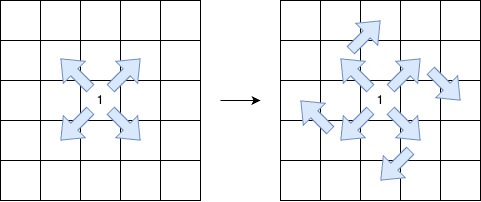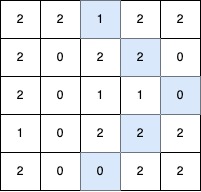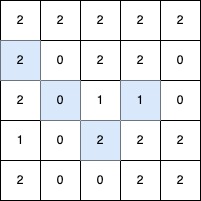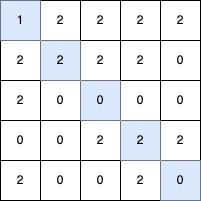LeetCode-in-Java
3459. Length of Longest V-Shaped Diagonal Segment
Hard
You are given a 2D integer matrix grid of size n x m, where each element is either 0, 1, or 2.
A V-shaped diagonal segment is defined as:
- The segment starts with
1. - The subsequent elements follow this infinite sequence:
2, 0, 2, 0, .... - The segment:
- Starts along a diagonal direction (top-left to bottom-right, bottom-right to top-left, top-right to bottom-left, or bottom-left to top-right).
- Continues the sequence in the same diagonal direction.
- Makes at most one clockwise 90-degree turn to another diagonal direction while maintaining the sequence.

Return the length of the longest V-shaped diagonal segment. If no valid segment exists, return 0.
Example 1:
Input: grid = [[2,2,1,2,2],[2,0,2,2,0],[2,0,1,1,0],[1,0,2,2,2],[2,0,0,2,2]]
Output: 5
Explanation:

The longest V-shaped diagonal segment has a length of 5 and follows these coordinates: (0,2) → (1,3) → (2,4), takes a 90-degree clockwise turn at (2,4), and continues as (3,3) → (4,2).
Example 2:
Input: grid = [[2,2,2,2,2],[2,0,2,2,0],[2,0,1,1,0],[1,0,2,2,2],[2,0,0,2,2]]
Output: 4
Explanation:

The longest V-shaped diagonal segment has a length of 4 and follows these coordinates: (2,3) → (3,2), takes a 90-degree clockwise turn at (3,2), and continues as (2,1) → (1,0).
Example 3:
Input: grid = [[1,2,2,2,2],[2,2,2,2,0],[2,0,0,0,0],[0,0,2,2,2],[2,0,0,2,0]]
Output: 5
Explanation:

The longest V-shaped diagonal segment has a length of 5 and follows these coordinates: (0,0) → (1,1) → (2,2) → (3,3) → (4,4).
Example 4:
Input: grid = [[1]]
Output: 1
Explanation:
The longest V-shaped diagonal segment has a length of 1 and follows these coordinates: (0,0).
Constraints:
n == grid.lengthm == grid[i].length1 <= n, m <= 500grid[i][j]is either0,1or2.
Solution
public class Solution {
private final int[][] directions = { {-1, -1}, {-1, 1}, {1, 1}, {1, -1}};
private void initializeArrays(
int[][] bottomLeft,
int[][] bottomRight,
int[][] topLeft,
int[][] topRight,
int m,
int n) {
for (int i = 0; i < m; ++i) {
for (int j = 0; j < n; ++j) {
bottomLeft[i][j] = 1;
bottomRight[i][j] = 1;
topLeft[i][j] = 1;
topRight[i][j] = 1;
}
}
}
private int processBottomDirections(
int[][] grid, int[][] bottomLeft, int[][] bottomRight, int m, int n) {
int ans = 0;
for (int i = 0; i < m; ++i) {
for (int j = 0; j < n; ++j) {
int x = grid[i][j];
if (x == 1) {
ans = 1;
continue;
}
if (i > 0 && j + 1 < n && grid[i - 1][j + 1] == 2 - x) {
bottomLeft[i][j] = bottomLeft[i - 1][j + 1] + 1;
}
if (i > 0 && j > 0 && grid[i - 1][j - 1] == 2 - x) {
bottomRight[i][j] = bottomRight[i - 1][j - 1] + 1;
}
}
}
return ans;
}
private void processTopDirections(
int[][] grid, int[][] topLeft, int[][] topRight, int m, int n) {
for (int i = m - 1; i >= 0; --i) {
for (int j = n - 1; j >= 0; --j) {
int x = grid[i][j];
if (x == 1) {
continue;
}
if (i + 1 < m && j + 1 < n && grid[i + 1][j + 1] == 2 - x) {
topLeft[i][j] = topLeft[i + 1][j + 1] + 1;
}
if (i + 1 < m && j > 0 && grid[i + 1][j - 1] == 2 - x) {
topRight[i][j] = topRight[i + 1][j - 1] + 1;
}
}
}
}
private int findMaxDiagonal(int[][] grid, int[][][] memo, int m, int n, int initialAns) {
int ans = initialAns;
for (int i = 0; i < m; ++i) {
for (int j = 0; j < n; ++j) {
int x = grid[i][j];
if (x == 1) {
continue;
}
x >>= 1;
for (int k = 0; k < 4; ++k) {
int v = memo[k][i][j];
if ((v & 1) != x) {
continue;
}
if (v + memo[k + 3 & 3][i][j] > ans) {
int[] d = directions[k];
int ni = i - d[0] * v;
int nj = j - d[1] * v;
if (ni >= 0 && nj >= 0 && ni < m && nj < n && grid[ni][nj] == 1) {
ans = Math.max(ans, v + memo[k + 3 & 3][i][j]);
}
}
}
}
}
return ans;
}
public int lenOfVDiagonal(int[][] grid) {
int m = grid.length;
int n = grid[0].length;
int[][] bottomLeft = new int[m][n];
int[][] bottomRight = new int[m][n];
int[][] topLeft = new int[m][n];
int[][] topRight = new int[m][n];
initializeArrays(bottomLeft, bottomRight, topLeft, topRight, m, n);
int ans = processBottomDirections(grid, bottomLeft, bottomRight, m, n);
processTopDirections(grid, topLeft, topRight, m, n);
int[][][] memo = {topLeft, topRight, bottomRight, bottomLeft};
return findMaxDiagonal(grid, memo, m, n, ans);
}
}

